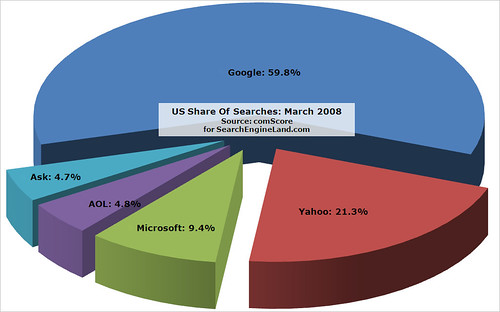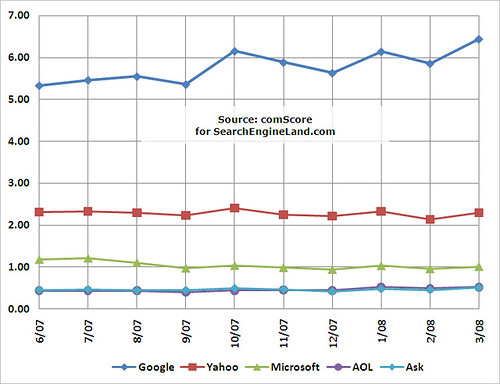comScore: New Google High, New Yahoo & Microsoft Lows, Though Both Rise In Raw Searches
Continuing from previous search stats from Hitwise and Compete, comScore is now out with search engine share in the United States for March 2008. Similar to Hitwise, Google hits a new high while Microsoft and Yahoo hit new lows. But in terms of raw searches, Yahoo and Microsoft showed gains. Searches that happened on the […]
Continuing from previous search stats from Hitwise
and Compete,
comScore is now
out with search engine share in
the United States for March 2008. Similar to Hitwise, Google hits a new high
while Microsoft and Yahoo hit new lows. But in terms of raw searches, Yahoo and
Microsoft showed gains.
Searches that happened on the five "core" search engines that comScore tracks stack up as follows:
- Google: 59.8%
- Yahoo: 21.3%
- Microsoft: 9.4%
- AOL: 4.8%
- Ask: 4.7%
The trend over time? Here’s data going back to June 2007 (I don’t have
previous months because comScore
changed its methodology,
and I don’t have adjusted figures prior to that period):
Google set a new high in the period shown while Yahoo and Microsoft set new
lows. Both had previous lows in Feb. 2008, 21.6% and 9.4%, respectively. Google’s previous high was in Feb. 2008 at 59.2%.
How about number of searches versus market share?
- Google: 6.4 billion
- Yahoo: 2.3 billion
- Microsoft: 1 billion
- AOL: 521 million
- Ask: 503 million
The trend:
As you can see, despite "dips" for Yahoo and Microsoft, comScore has them
both gaining in number of searches for March 2008. It’s just that Google gained
so many more searches that on a percentage basis, it got a bigger slice of the
pie.
Caveat Time!
As a reminder, my general rules when evaluating popularity stats:
- Avoid drawing conclusions based on month-to-month comparisons. Lots
of things can cause one month’s figures to be incomparable to another month.
It’s better to see the trend across multiple months in a row.
- Avoid drawing conclusions based on one ratings service’s figures.
Each service has a unique methodology used to create popularity estimates.
This means that ratings will rarely be the same between services. However, a
trend that you see reflected across two or more services may give you faith in
trusting that trend.
- Consider Actual Number Of Searches: While share for a particular
search engine might drop, the raw number of searches might still be going up
(and thus they might be earning more money, despite a share drop). This is
because the "pie" of searches keeps growing, so even a smaller slice of the
pie might be more than a bigger slice in the past. See
Nielsen NetRatings:
August 2007 Search Share Puts Google On Top, Microsoft Holding Gains for a
further explanation of this.
Opinions expressed in this article are those of the guest author and not necessarily Search Engine Land. Staff authors are listed here.
Related stories


